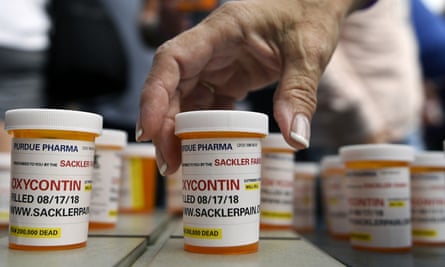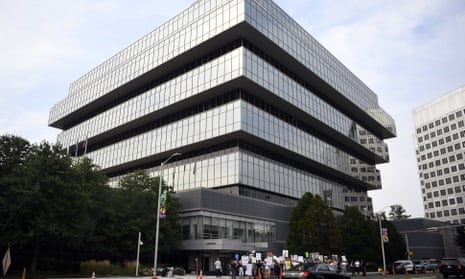Oklahoma’s attorney general, Mike Hunter, thought it best to take the money and run.
Just weeks from the start of a much-anticipated trial against the company at the heart of the US opioid epidemic, Hunter was unnerved when Purdue Pharma began making noises about declaring bankruptcy in the face of mounting lawsuits over its powerful narcotic prescription painkiller, OxyContin.
Fearing that Oklahoma might be left unable to collect, which would be bad for the state and for the attorney general’s political standing, he decided to settle for a total of $270m from Purdue and branches of the Sackler family that own the company, it was announced on Tuesday.
“We had to take into account that they were modelling bankruptcy,” said Hunter.
The settlement was far more than any other state has managed to squeeze out of Purdue over its criminal marketing of OxyContin, including false claims to doctors that it was less addictive than other opioids. The $75m payment by members of the Sackler family, as part of the $270m, was a first.
The Sacklers said their $75m payment was a “voluntary pledge” to establish an addiction and treatment centre in Oklahoma and did not amount to an admission of culpability. But it was the first time the family has directly contributed toward addressing the consequences of the opioid epidemic.
Lawyers saw it as significant for another reason. The money came as a result of negotiations with the state’s attorney general and was part of the overall $270m settlement between Hunter and Purdue, meaning the Sackler family became directly involved in the legal case even though family members had not been named in this particular litigation.
Hunter may have been smart to get what he can from Purdue while he can as the company finally begins to reap the results of the tragedy it sowed two decades ago.
The Oklahoma settlement is a foretaste of a barrage of civil lawsuits in the pipeline against not only Purdue but dozens of drug manufacturers, distributors and pharmacies as cities and states seek billions of dollars from those they blame for the biggest drug epidemic in US history.
Lawyers behind the largest of the actions – combining claims by more than 1,600 communities, from West Virginia coal towns to Native American reservations, in a federal case in Ohio – see the Oklahoma settlement as evidence that Purdue knows it has little chance of winning in court. But they also understand that the scale of the total settlement they are seeking, to match the huge payouts by the tobacco industry two decades ago in order to fund the vast public costs of the social consequences of the epidemic, will have to be paid by more than just Purdue.
“This settlement is another reflection of the extraordinary importance and strength of the claims against Purdue Pharma,” the lawyers said in a joint statement. “Purdue’s wrongdoing, however, does not stand alone. There are nearly two dozen other defendants with pending allegations against them in federal court. We believe all of these defendants – opioid manufacturers, distributors, and pharmacies – must be held responsible for their role in the epidemic, and we will continue to pursue accountability for the thousands of communities we represent.”

A major obstacle for Purdue is that it already has a criminal conviction for many of the actions for which it is now being sued. In 2007, the company pleaded guilty to a felony and was fined $600m over its aggressive sales campaign to flood the country with OxyContin by pressuring doctors to prescribe it. The company admitted to training its sales representatives to falsely claim that what drug enforcement agents called “heroin in a pill” was less addictive and safer than other opioids, among other crimes.
Purdue’s president, general counsel and chief medical officer were also convicted and fined $34m between them.
Many of the civil lawsuits against the company are rooted in the consequences of the criminal marketing of OxyContin.
More recently, lawsuits have also focused on the families of Mortimer and Raymond Sackler, the doctor brothers who turned Purdue Pharma into a pharmaceutical giant and ran it as OxyContin drove the opioid epidemic. A Massachusetts case and cases in New York have named eight members of the Sackler family alleged to have played a part in the rise of OxyContin. Among them is Richard Sackler, the son of Raymond, who as president of Purdue Pharma in the 1990s promised a “blizzard of prescriptions” that would make OxyContin the go-to drug for pain treatment.
The case against other companies may be harder to prove, although some of them may choose to reach financial settlements rather than have a public airing of the accusations that they put profit over American lives. Among the biggest is the drug distributor McKesson, which has the fifth largest revenue of any company in the US. Two years ago it paid a $150m fine for failing to fulfil its legal obligations to monitor deliveries to pharmacies of millions of opioid pills. McKesson and other distributors are accused of pouring opioids into states at the epicentre of the crisis, particularly West Virginia, where millions of pills were delivered to small-town pharmacies.

As the lawsuits have piled up, Purdue Pharma has sought to paint the legal actions as “squandering resources on protracted litigation” that could go to help those who have become addicted. It is running adverts claiming to be at the forefront of fighting drug abuse. The company characterised the Oklahoma financial settlement as an act of largesse by describing it as “an extension of our commitment to help drive solutions to the opioid addiction crisis”.
Purdue is also promoting its new antidote, Nalmefene, which is designed to reverse opioid overdoses. The company has said it will not profit from the drug.
At the same time, Purdue is playing down the role of OxyContin in the epidemic. It has attempted to shift the focus to the surging number of deaths from illegal drugs such as heroin and black-market fentanyl. Meanwhile, the Centers for Disease Control calculates that 70% of heroin users began with prescription opioids.
The civil actions may prove to be only the beginning of the problems for those who run and own Purdue. The company and members of the Sackler family are also targets of criminal investigations. And their long tradition of arts and educational philanthropy has been turned upside down in the last year, with protests by anti-Sackler activists and the cascade of allegations from lawsuits. This has come to a head in the last week with institutions in the US and UK eschewing offered or future potential gifts and one of the family foundations suspending donations amid the furore.
Those who have suffered the most from the epidemic have long complained that companies paying out-of-court settlements regard them as “the cost of doing business”. They want to see the individuals who made the decisions to push opioids on to an unsuspecting American public held to account.
“We need criminal charges brought against these people,” said Emily Walden, chair of the Fed Up Coalition of families hit by the epidemic and medical specialists. “We need to throw some of these people in prison. I do not want this to come across as the cost of doing business where they can still have billions of dollars in their pockets.”
